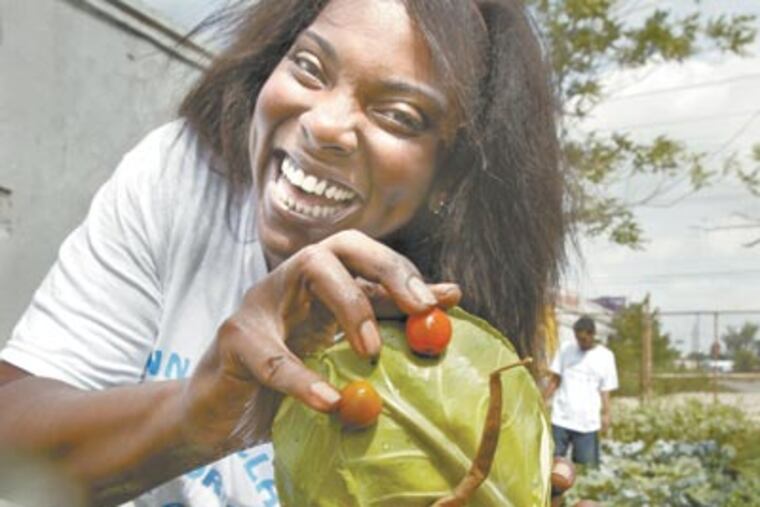Kevin Riordan: Community gardening flourishes in Camden
When he started tilling his East Camden garden last March, Jonathan Rosado used a sledgehammer. A jackhammer might have been useful, too.

When he started tilling his East Camden garden last March, Jonathan Rosado used a sledgehammer. A jackhammer might have been useful, too.
"It was gravel and stumps, and we had to knock everything out to get to the dirt," says Rosado, a youth program member at the Woodland Community Development Corp. (WCDC).
A 48-by-12-foot garden alongside the WCDC's Federal Street headquarters is yielding a bounty of lush greens, robust eggplants, and luscious tomatoes for clients of the organization's food pantry. Rosado, 21, and about 10 other youth-program members are gaining horticultural and entrepreneurial experience, too.
"This was nothing when we started," says the Rev. Floyd White, pastor of Woodland Avenue Presbyterian Church, as he gives me a tour. "Isn't this something?"
Something indeed: Rows of broccoli, zucchini, cabbage, green beans, collard greens, and other veggies are flourishing. Cucumber vines curlicue up a chain-link fence topped with barbed wire. Youth, volunteers and AmeriCorps workers water and weed and water again amid the near-constant thuds and shudders of truck traffic.
In a city almost as famous for its shortage of supermarkets as for its abundance of social ills - a city that's been described as a desert for fresh, affordable, and locally grown food - gardens like Woodland's are blossoming all over town.
In South Camden, the nonprofit Center for Environmental Transformation operates a greenhouse that supplies seedlings for individual and community gardens. There also are cooking classes, a fledgling farmers' market, and a "junior farmer" program.
The Camden City Garden Club (CCGC), which began greening the city in 1984, has built more than 80 community gardens, including 31 in 2009 alone. CCGC distributes vegetable seedlings citywide and hosts a "farm stand" during its monthly meetings and at special events.
Truly grassroots efforts like these drew attention at the national conference of Sustainable Agriculture and Food Systems Funders (SAFSF) in June in Philadelphia. Convention-goers visited the CCGC program, as well as Cathedral Kitchen (Woodland's Federal Street neighbor), where halfway-house clients and others are trained for careers in food.
"Camden does have some great examples of the community working together to help increase access to healthy, affordable food," SAFSF's Bridget Dobrowski says.
One doesn't have to be a locavore - the term for partisans of locally grown food - to be heartened by a community's desire to break free of our national addiction to sweet, salty, highly processed, and fat-producing foods.
Crediting CCGC's pioneering work, the William Penn Foundation's Andrew Johnson says the growth of community gardening in Camden "is emblematic of the potential of the local food movement."
The Delaware Valley Regional Planning Commission also supports these efforts. The agency is working on a "Plan for a Sustainable Food System" for the Philadelphia area, and nonprofits are an essential component. "There is a tremendous amount of innovative, on-the-ground work" in Camden, DVRPC's Alison Hastings says.
Rosado, who wants to become a horticulture professional, and his dad, Juan, a lifelong gardener, know all about tremendous amounts of on-the-ground work. They and others did all the excavating, building, and mulching by hand in March, and by May it was time to handpick the first lettuce and collards.
The garden began with about $800 in seed money, says White. He hopes to start a weekly farmers' market next year to sell produce remaining once the needs of food-pantry clients are served.
"With all the land that you have in the city, particularly vacant land," White says, "the harvest could be plentiful."
Reclaiming the so-called food desert is all well and good, of course. But let's not forget a basic fact about one of the basic food groups.
"I've tried a few of the tomatoes," says Lamar Young, a 16-year-old gardener. "They taste good."